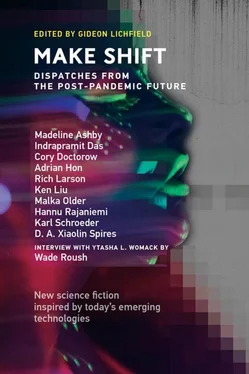“Claro, claro, that’s not what I meant. It’s a lovely thing you’re doing, you know I think that.”
Chela did not know that. Even after she had (more or less) convinced her mother that Elder Resources was not an evil, exploitative conspiratorial government surveillance operation, she still reliably made a face whenever Chela mentioned it.
“Es que I just don’t know what I have to say that should be recorded for posterity. Lots of people lived like me.”
“Not all of them are getting their stories told, Mami.” Chela had explained it to her so many times: how the priority was given to the oldest and the chronically ill. A lot of people got missed, their stories lost until it was too late, which was exactly what the network was supposed to mitigate… but no use crying over that at this point. “They do adjust somewhat for different life expectancies for historically oppressed groups.” That was the usual term these days; Chela had expounded often on how the oppression was not just historical. “But not enough, and definitely not a granular enough level to account for—”
Her mother usually interrupted her before she could list some of the conditions that could exacerbate standardized categories—displacement by violent national upheaval, poverty-wage work, poverty-wage nutrition, child-bearing and -rearing—and eventually Chela had twigged to the fact that her mother didn’t enjoy being reminded of her own diminished life expectancy.
Which was reasonable enough.
Still, though.
“Your perspective is so important. We don’t hear from enough people like you—”
“I know, I know, because we fall apart before you can get to us.”
“—precisely because you’ve all been taught to believe your voice is unimportant! None of you want to talk about it because you think your lives are boring or trivial, but—” and Chela had to stop before blurting out how much she wished she could better understand her mother’s life, how frightened she was of losing her before she could.
“I just think they should be paying you more,” her mother said with classic tangentiality.
“They should, but nobody else is going to, so why should they?” Chela responded almost automatically. She didn’t know what strand of disinformation was making her mother so resistant to being interviewed, and she didn’t have the strength to attempt a debunking right now, so they might as well rehash her salary expectations again.
THE INTERVIEW WITH THE EIGHTY-SEVEN-YEAR-OLD MAN WENT ABOUT AS EXPECTED.Chela’s avatar was designed to be noticeably not video—a slightly stylized line drawing, like a filter set over the video—but it still showed her reactions and expressions in real time, allowing for nonverbal encouragement. She couldn’t see her own avatar, though, because it would always match the respondent’s in race; ergo, if she saw it, she would know the race of the person she was talking to. Not that it was hard to figure out, if she cared to. She probably could make a statistically certain guess if she bothered to track the demographics of the various neighborhoods he had moved into and out of throughout his eighty-seven years in the Greater Boston area. But she had a pretty good idea already and it didn’t matter enough to her to confirm it.
He started about as antagonistic as she had expected from their earlier conversation. “I hope this is worth my time. And my tax dollars!”
Chela did not say that the last time they spoke he had said he had nothing else to do, did not point out that as a retiree he was on the benefitting side of taxes. “Sir, do you participate in ElderWheel?” She already knew he did, so she didn’t have to wait for his affirmative grunt. “Have you benefitted from the Supporting Aged Independent Life Act? Both of those initiatives came directly from ideas and information collected during interviews like these, and they might not have become reality without the accumulated data we collected about the needs and preferences of the elderly.”
“Well, I suppose…”
“Did you talk to elders when you were younger?”
“Well… my parents and other relatives, I suppose. Never really had much call to barge in on other old people.”
I made an appointment! Chela screamed internally. “This program gives younger people like me the opportunity to connect with and learn from our elders, even without a family relationship and in perfect anonymity.” She had said this so often that she didn’t even have to think about it—and this was the extra, extra pitch. People really did hate being interviewed.
“I guess. What is it you want to know about, anyway?” the old man asked, suspicious.
So predictable. If it weren’t for the fact that most of them loved it once they got into it, that so many of them showed her explicitly or implicitly how much they appreciated the conversation, Chela probably would have quit by now. “We want to hear about the conditions of your life, the context, what was going on in your neighborhoods and city when you were younger, as well as anything you want to share with the future.” She phrased it as soothingly as she could (not saying, for example, tell us what you would want to tell your grandkids if they cared to listen to you ), although that last bit was always dicey. Hard to refer to posterity without reminding people of death.
The old man was silent for a moment, and Chela spoke again. “If you have a story or impression you want to start with, we can do that.” Some people were primed to share, stuff they had told their grandkids a million times or maybe didn’t have any grandkids to tell. And then there were the other ones, who for one reason or another—dominance, the opposite of dominance—had been trained not to talk about themselves with any type of interiority, anything that might spark emotions. “But otherwise I have plenty of questions.”
“Oh, yeah,” he said. “I’ll answer whatever you’ve got.”
So she got them started. There was a backbone (that was Elder Resources’ term, not Chela’s) of questions they had to ask everyone, but from there Chela had the latitude, or responsibility, to explore different avenues.
It had started out as latitude, when Chela was still excited about the job and the way it dovetailed with her grad school research, when she found everything interesting, when she believed in the whole Elder Resources concept, hoped it might fulfill itself like a fucking prophecy. Now she told herself it was a responsibility, that she had to do her job as well as she could, for professionalism if nothing else. Not that she didn’t still occasionally get interested enough in what some elder was telling her to want to explore more, but a lot of the time she had to remind herself not to rush through it.
She was trying not to get so calloused that she would forget about anything but the backbone.
“What’s the point of this, anyway?” The old man sounded restless, and Chela realized she probably hadn’t been giving the right cues ( I’m interested, I care, this is fascinating and useful, tell me more ) for the last few answers.
What was the point? Chela took a fortifying gulp of her now-cold espresso and a deep breath.
The old man, probably not realizing that she was about to speak, went on. “I mean, I understand the principle . People think that maybe what some old people knew, if we’d paid attention to it, could have prevented a lot of the stuff we’re dealing with now, or fixed things sooner, back when—but I mean, do you really think I hold the answer to any of the world’s problems?”
No, I don’t. But that self-deprecating note reminded Chela inescapably of her mother. “That’s not really what this organization is about.”
Читать дальше












